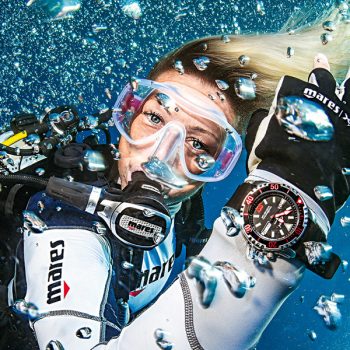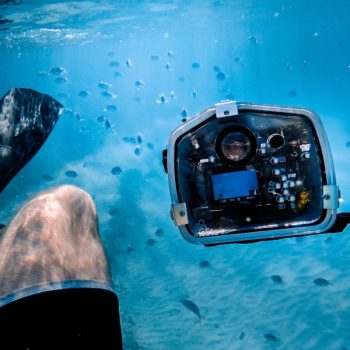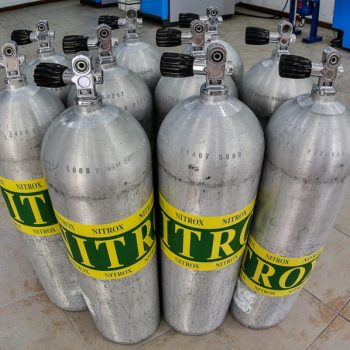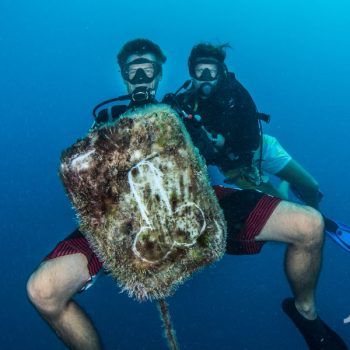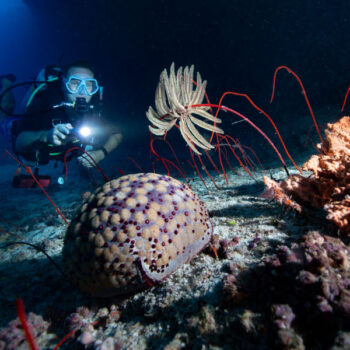IDR 3.100.000
Perfect Buoyancy is the most important skill to master in scuba diving. Polish your buoyancy control with the Peak Performance Buoyancy Specialty to glide effortlessly, extend your dive time and use less air. Refine your skills and elevate them to the next level.
No matter what your interests in diving are, having perfect buoyancy is the key to success. Become a better diver with Divine Divers Gili Meno with the Peak Performance Buoyancy Specialty Course!
Buoyancy control is a skill that most beginners struggle with and most instructors will highly recommend additional training. Learning how to be neutrally buoyant is like a baby learning to walk. It’s new, sometimes a struggle, a little bumpy at first, takes practice and does not come overnight. Once mastered, it becomes second nature and is done without thinking about it.
Without a doubt perfect buoyancy is a key skill for all divers. Better buoyancy means more enjoyment, longer dives and a happier (diving) life.
With the help of the peak performance buoyancy specialty, you will for sure take a step towards perfect buoyancy and enjoy more relaxed dive adventures.
You will gain better understanding and skills to be able to control your buoyancy to a level that makes you stand out as a better diver. Practice both on land and in the water is fun and the best part is to see how fast you improve. Almost all people taking the buoyancy specialty training dramatically improve their time under water, reduce their weight and have more easy and joyful dives.
Upon completion, you will earn the Peak Performance Buoyancy Specialty certification.
With better buoyancy skills, you will soon be able to hover with ease and take the underwater photographs you dream of!
This specialty course also count towards the prestigious Master (Scuba) Diver rating.
The Perfect Buoyancy (also called Peak Performance Buoyancy) course consists of two ocean dives and one optional pool session.
We conduct the course in one day and will join the boat on two occasions during that day.
Since buoyancy control is hands on training, we will cover the necessary theory behind neutral buoyancy but our main focus will be on the practical part. You will get the chance of independent learning of course.
With your instructor you will mainly focus on breathing exercises and practicing buoyancy control in the open water under real life conditions. We will use probes or obstacles to enhance the learning experience.
Would you like to know what other speciality programs we teach? Or you wonder why you should consider doing a specialty course? Please check our FAQs to gain some additional knowledge.
Please note: Our courses are conducted in accordance with PADI standards.
Please note, the waters around the Gili Islands have been declared a Marine Park. Therefore a one time Marine Park fee of 100.000 IDR has to be paid by all diving and snorkel tour participants. This fee is NOT included in our prices and has to be paid in cash at our dive center on Gili Meno.
If booked in advance with a 50% deposit paid the course comes to a price of 2.945.000 IDR. If you would like to take advantage of this pre-booking discount please contact us directly per email. Please note, the deposit needs to arrive on our bank account before you arrive on the island, otherwise it is not a pre-booking discount. LOL
Plans change. We know that too. Our cancellation policy is flexible and we are trying our best to meet your holiday schedule and potential interruptions of it. If you book a course in advance but you are then unable to do it because you get sick, we will reimburse you of course minus the transaction details.
We can only send you the login details for the eLearning packages once you have paid the full course or a deposit in advance. In the (hopefully unlikely) event that you can’t start the course as planned, you will get of course more time to make it to the island and if even that isn’t going to happen, you will still have the theory and can use that at another dive center at a later stage in your life (within one year).
In general, specialty programs are a great way to improve your current skills and learn new ones that peak your interest. Also, when you complete a certain number of logged dives and specialty programs you will earn the elite Master Scuba Diver Rating once you have completed the rescue course, five specialties and a minimum of 50 dives.
Specialty courses allow you to focus on a certain area of diving that interest you. They are a great way to improve your diving skills. Divine Divers on Gili Meno offer following specialties – we will list them according to popularity:
Nitrox Specialty: The most popular specialty course. Dive safer, become less tired and extend your no-decompression time by breathing enriched air nitrox.
Deep Specialty: Become certified to dive to 40 meters and learn about decompression theory and diving planning.
Perfect Buoyancy: The most recommended specialty by most instructors. During PPB (Peak Performance Buoyancy) we improve your buoyancy by playing games underwater, experimenting with breathing patterns, weight placement and learning efficient finning techniques.
Drift Diving: Learn about drift and current diving and discover flying under water. We will practice buoyancy control, negative entries, navigation, use of surface signaling equipment and buddy communication. By the end of waive, tide and current course, you’ll have the skills you need to go with the flowand navigate through a strong surge.
Night Diving: Learn techniques for diving at night and discover the unique creatures that come out after sunset. It’s a whole different world after dark.
Fish Identification / Underwater Naturalist: Get a better understanding about the marine ecosystem and the differences between terrestrial and aquatic worlds. See new things, learn about the most important fish families in the tropical waters around the Gili Islands and learn to differentiate between different fish
Underwater Photography and Videography: Learn to take awesome photos or videos underwater to show off online.
Wreck Specialty: There are thousands of shipwrecks to be found in the oceans, seas and lakes all over the world! This course will give you skills to navigate and enjoy shipwrecks while teaching you how to recognize and avoid unique hazards wrecks pose to us as divers.
Underwater Navigation: Navigation can be quite a hard skill for a new diver to master. Learn compass proficiency, navigation patterns and natural navigation to make your dives more enjoyable.
Search and Recovery: Learn about search patterns, knot tying and use a lift bag to find missing objects underwater.
First Aid & CPR: A prerequisite to the Rescue Course. You will learn important techniques that may one day save a life and improves your willingness to help at an accident scene.
Environmental / Ecology Specialties: Environment specialty programs are the perfect way to enhance your dive experience by learning about different marine life, how ocean ecosystems function and how to dive safely with sharks, rays and more. The environment specialties can either be taught as a dry course (online and with classroom sessions) or as a two dive specialty. Here are the Divine Divers Gili Meno options:
Other specialty courses
If there is anything else that tickles your fancy, just let us know- other specialties are for example: Boat Diving, Equipment Techniques, Decompression Diving , Self-Reliant Diver, Full Face Mask Diver, and of course specialty programs that don’t really fit our tropical environment (ice diving, dry suit, etc)
Your entire life! Certifications do not have an expiry date. If you have not dived in more than a year we do recommend refresher training especially when you don’t have extensive dive experience.
There are some serious conditions such as epilepsy, active asthma, emphysema, heart disease or haemophilia that could prohibit any diving activity. Since you are looking at advanced training you have surely filled in a medical questionnaire at least once before. If you had to provide a before a fit-for-diving-confirmation from a doctor then, you will most likely have to bring one again. However, things change and maybe some health issues have resolved themselves whereas other might have appeared. If you are not sure, please check the Medical-Statement and if in doubt contact us.
If you are interested in getting your scuba diving certification, you’ve probably come across PADI and SSI, the two major training agencies in the world. But is there a big difference or is one better than the other?
Instructors of both agencies will teach you how to be a skilled diver, as there is a certain skill set that every diver needs to have. Therefore, all diving agencies follow a legal framework laid down by the World Recreational Scuba Diving Council. The training agencies also accept each other; hence you could do an Open Water Course with the one and an Advanced Course with the other agency.
The main difference is in the theoretical education, requirements and certification costs. And of course, much comes down to personal preferences and other factors such as the teaching skills of your instructor and the conditions of the water.
We have decided to offer PADI courses even though most of our instructors can teach both PADI and SSI.
PADI and SSI differentiate slightly in between the different diver levels. You can mix and match the courses depending on what you are aiming at. When you complete a certain number specialties, you’ll earn different recognition levels up to the elite Master (Scuba) Diver rating. These ratings display your competency and build a solid base for more adventures to come. You can also credit a certain amount of specialties from the one agency to the Master (Scuba) Diver rating of the other agency.
| Level | SSI | PADI |
| Level 1 | Open Water Diver | Open Water Diver |
| Level 2 | Specialty Diver – 12 Dives and 2 Specialities OR Advanced Adventurer (optional) | Advanced Open Water Diver |
| Level 3 | Advanced Open Water Diver – 24 Dives AND 4 Specialities | Rescue Diver |
| Level 4 | Master Diver – 4 Specialities + Rescue Course AND 50 dives | Master Scuba Diver – Rescue Diver + 5 Specialities AND 50 dives |
Postcard-like white sandy beaches, azure and year-round warm waters (28 to 29 degrees), the reef on your doorstep and a great lifestyle – does this sound like paradise to you? The Gilis offer great diving all year round and are known as the turtle capital in the world – rightfully so, because both green and hawksbill turtles are abundant. Reef sharks are also frequently spotted and there is a broad range of marine life to be met on all dives. The dive sites are rarely more than a 15-minute boat ride from Divine Divers Gili Meno. The dry season is running from May to October and the rainy season from November to April. Rainy season sounds more extreme than it actually is because it hardly ever rains an entire day – expect showers at different severity but therefore less people.
We love what we do! We have been in the diving game for over 10 years as Divine Divers on Gili Meno (but our passion for diving didn’t start here). Apart from our location in paradise and at the most beautiful spot on Gili Meno we are both professional and enthusiastic about diving. Our groups are small and our instructors hand chosen for their personality and excellent teaching records. Safety is our primary concern; our equipment is in excellent order and of course regularly maintained. We are committed to offering first-class service and superior quality dive courses. However, our main differentiator is our personal approach. We live Divine Diver and consider the dive shop more as a family than a business. Some guests just end up staying for months or even years…
